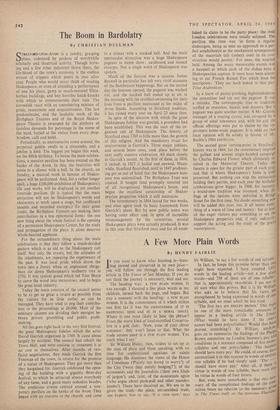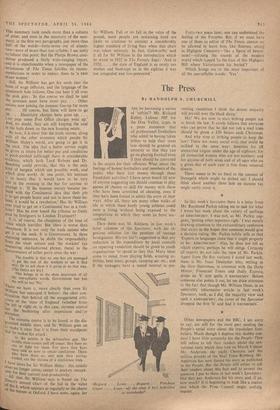A Few More Plain Words
By HENRY FAIRLIE
IF you want to know what humbug is—hum- bug stewed and preserved in its own juice— you will follow me through the first leading article in The Times of last Monday. If you do not think the journey is necessary, wait and see.
The heading was: A FEW PLAIN WORDS. It was enough. I shouted a few plain words at my children, turned back the page, and began. But stay a moment with the heading: A FEW PLAIN WORDS. It is the commonness of it which strikes one first (as it was the commonness of IT IS HAPPENING HERE and IT IS A MORAL ISSUE). Where is one most likely to hear the phrase? From the worst kind of loud-mouthed Conserva- tive in a golf club: 'Now, none of your clever nonsense: they won't listen to that. What the trade unions need is A FEW PLAIN WORDS. You mark what I say.'
Sir William Haley, then, wishes to set up as the man of plain and blunt speaking, with no time . for sophisticated opinions or subtle language. He dismisses the views of the House of Commons (Plainly too bored to worry'); of the City (were they merely hedging?'); of the economists and the journalists (`their own kinds of jargon'); and, later, of the economists again ('who argue about push-pull and other mumbo- jumbo'). These have deceived us. We are to be given the truth—the plain, unvarnished truth, one expects him to say. 'It is time now,' says Sir William, `to say a few words of one syllable.
In fact, he keeps this promise better than one might have expected. I have counted 1,012 words in the leading article—not a few plain words—and 738 of them are of one syllable: that is, approximately two-thirds. I am not at all sure what this proves. But it is Sir WOO' who asks us to believe that his views are strengthened by being expressed in words of one syllable, and we must admit he has tried. `The first two are PHELPS BROWN.' This intrt be one of the more remarkable sentences RI appear in a leading article in. The Tite3..; (What would he have done if the man names had been polysyllables? Would that have proved something?) Sir William, anyhow' goes on to summarise the findings of the PhelPd'' Brown committee on London busmen's pay all conditions in a sentence composed of five mono' syllables and one polysyllable: 'The busmen should have more pay.' He could, of course, have summarised it in this manner in words of entirely one syllable if he had simply said 'The — should have more pay.' After all, if there IS virtue in words of one syllable, there must :1140 be virtue in words of four letters. But, even more remarkable is that this sw11: mary of the complicated findings of the e•ollmil mittee bears no relation to the summary gIV""., in The Pmes itself on the previous Thuridar This summary took much more than a column of print; and even in the summary of the sum- mary, in the first two paragraphs, just more than half of the words—forty-seven out of ninety- two—were of more than one syllable. I am sorry to labour this point. But the Phelps Brown com- mittee produced a fairly wide-ranging report, and it is objectionable when a newspaper of the seriousness of The Times falsifies its recom- mendations in order to reduce them to 'A FEW PLAIN WORDS.'
Still, Sir William has got his teeth into the bone of wage inflation, and the language of the nineteenth hole follows. One can hear it all over the pink gins: 'In due course we shall be told the postmen must have more pay. . . . Other unions now joining the summer line-up for more pay- . . . Of course, bus fares will have to go °P. • . . Electricity charges have gone up. . . . Last year some Post Office charges went up.' And, no doubt, they are still keeping the coal in the bath down on the new housing estate.
BY now, it is clear that the trade unions, along with all the other monsters which people Sir William Haley's world, are going to get it in the neck. The idea that a better service might be given in return for better pay and conditions is Pooh-poohed (although there is considerable evidence, which both Lord Robens and Dr. Reeching could provide, that this is the only kind of bargain which can possibly work, and Which does work). At one point, his sarcasm is so heavy .that it would have to be very late in the evening in the bar for anyone to attempt it: 'If the busmen merely became im- bued with the Continental idea that their job is to get people home and not to leave them be- hind, it would be a revolution.' Has Sir William ever tried to get on a Continental bus in a rush- hour? Has he ever heard the tributes so freely paid by. foreigners to London Transport? It is, of course, the cheapness of the tone of
v°iee which 'terrifies. But there is worse than cheapness. It is not only the trade unions who get it in the neck. It is Government. In three alarming sentences, he shifts the responsibility from the trade unions and 'the workers' (an interesting old-fashioned phrase, there) to the Governments of either party since the war: The trouble is that no one has yet managed to get the rest of the workers to see it that Way. Or to tell them it is going to be that way. [The italics are his.]
This brings us to the most important of all the one-syllable words. Government has lost the will to say 'No.' There we have it, more clearly than even Sir William has managed it before: the clear con-
fi rmation that behind all the exaggerated criti- cisms of the 'state of England' (whether from the left or right or, in this case, extreme centre) lies the hankering after imposition and/or dictation. The extreme centre is to be found in the dis- rtmtled middle class, and Sir William goes on make it clear that it is from their standpoint that he makes his attack:
In the middle is the defenceless gap. The
middle class cannot pull off coups; they have no (Inc to fight for them. For years they have been told to save to create confidence. Those who have done so, and seen their savings eroded, arc the victims of a confidence trick. 1_,have news for Sir William Haley: this middle class no longer exists, except in pockets remark- able far their current non-productivity. All that Sir. William says is based on The ac4nalies's annual chart of the fall in the value which appears as regularly as the charts of the bumps at Oxford. I have news, again, for
Sir William. Fall or no fall in the value of the pound, most people are sustaining (and are likely to continue to sustain) a considerably higher standard of living than when that chart was taken seriously. In fact, Galsworthy said it all for Sir William in the introduction which he wrote in 1922 to The Forsyte Saga: 'And in 1920, . . . the state of England is as surely too molten and bankrupt as in the eighties it was too congealed and low-percented.'
Forty-two years later, one can understand the feeling of the Forsytes. But, if we must have one of them as editor of The Times, cannot we be allowed to leave him, like Soames, sitting in Highgate Cemetery—like a figure of Invest- ment'—refusing the sounds of the modern world which lapped `to the foot of this Highgate Hill where Victorianism lay buried'?
Which brings me to the most important of all the one-syllable words: 'Yes.'







































 Previous page
Previous page